
We’ve already covered the topic of book scouting in detail in our blog and mentioned book arbitrage briefly in one of the articles. Today, we’re going to talk about the entire field of retail arbitrage in general and book arbitrage in particular. Let’s take a closer look at how it works.
- What Is Retail Arbitrage?
- What Is Book Arbitrage?
- Retail Arbitrage Sourcing
- Online Retail Arbitrage
- How Much Can You Make with Retail Arbitrage?
- Is Retail Arbitrage Legal
What Is Retail Arbitrage?
Retail arbitrage is practically the same as reselling.
You compare a price of a given product on two or more markets, buy the product at the lowest price, sell it at a higher price, and profit from the difference.
You can buy used or discounted products from retailers and sell them on Amazon (or any other platform; though, Amazon is the most popular, so we’ll be referring a lot to it). You can source products from brick-and-mortar stores (e.g., outlets) as well as from online retailers.
The entire idea of retail arbitrage is about finding the best deals and selling with a profit.
Here is an example:
![]() You’ve found a high-rated product at a local store for just $5, purchased it, listed it on Amazon for $20, paid Amazon FBA fees, and got $10 in profit. Cool, isn’t it?
You’ve found a high-rated product at a local store for just $5, purchased it, listed it on Amazon for $20, paid Amazon FBA fees, and got $10 in profit. Cool, isn’t it?
The idea sounds simple; however, there is a lot to take into consideration, as there are millions of goods to choose from. Yet you need to understand the mechanics behind a successful arbitrage operation: the overall process of finding the most popular items (keyword research, price history, rating history, etc.), the knowledge of how to list a product, pricing and repricing rules, fees and taxes (in case of Amazon), and a lot more.
Best Categories for Retail Arbitrage
You can choose the niche where you’ll be operating by analyzing the products that are more popular among users.
The most recent statistics we’ve found are not entirely new (2019); however, according to Statista, the most popular product categories on Amazon were electronics, clothes, shoes, and jewelry, etc., home and kitchen appliances, beauty and personal care products, and books. Check the complete list below:
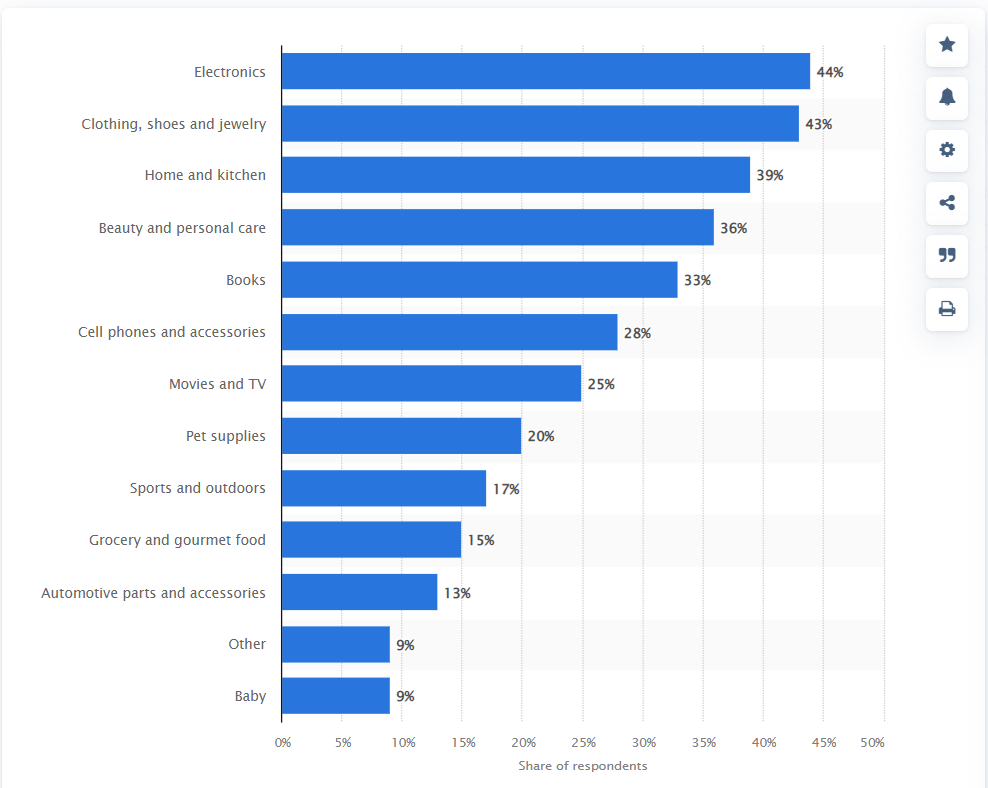
Leading product categories purchased by Amazon shoppers in the United States as of February 2019
Depending on your preferences, you can resell different products or focus on one specific category (and a niche with less competition), where you’ll be able to dig out the most interesting and potentially profitable items.
Best Retail Arbitrage Products
When you’ve researched the categories and selected the niche, it makes sense to check what products sell well. There are some goods that you can also pay attention to even if they are not in the category of your choice. Thanks to coronavirus, the following products are considered Amazon best-sellers at the moment:
- Personal care items
- Games and puzzles
- Board games
- Fitness items
- Face masks
- Haircare products
- Nail polish
- Pet supplies
- Books
From here, you can narrow down your product research even more to reduce competition. By doing so, you also target the buyers that come to buy and make sure your product is easy to find.
What Is Book Arbitrage?
Book arbitrage is the same as retail arbitrage; the only difference is that you are focusing on one category instead of many—books.
Books are among one of the most popular categories for reselling. Why is that? The answer is simple: the market is flooded with cheap (usually used or discounted) books that you can buy at very low prices (even for less than $1) and then resell with a profit. That’s for one thing; for another, people still like buying books—not just digital copies, but old-school hardcovers and paperbacks as well—they all are in demand.
Simple example:
You’ve found The Bridge: The Building of the Verrazano-Narrows Bridge at a local thrift store for $3 and can sell to an online vendor by checking the best price offers on BookScouter:
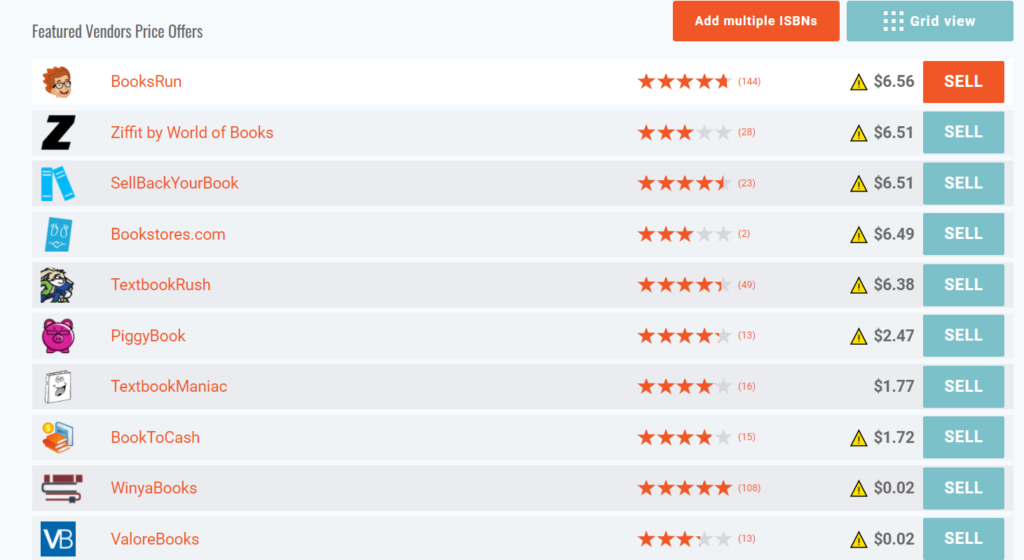
Or you can list it on Amazon:
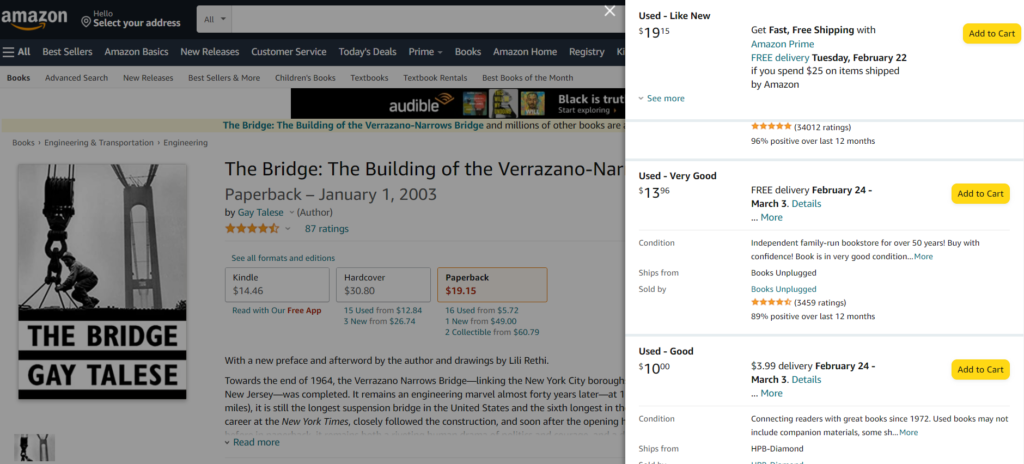
Either way, you’ll get a profit.
However, the profit amount and the success in book arbitrage depend on many factors as well as your strategy and expectations. If you are aiming for bigger gains, Amazon is the place to go. But sometimes, it is better to sell to a third-party vendor and get paid less but right away.
Book arbitrage is a huge niche, and many people do it as a side hustle. Many professional book scouts also source books online and sell via Amazon FBA (Fulfilled by Amazon program) or other websites. You should be prepared to enter a very competitive environment; however, there is no need to be discouraged.
Retail Arbitrage Sourcing
Where do you source books for reselling? There are two options: you either go to local brick and mortar shops, thrift stores, garage, estate, and library sales and buy physical copies that you pack and ship yourself, or you can get books online.
Best Stores for Retail Arbitrage
You can start sourcing retail arbitrage products to resell them further (for instance, on Amazon) by checking your local retail and discounter stores. If you are using the Amazon reseller app, you can check the prices for the products instantly. Here is the list of the stores we’d recommend:
- Walmart
- Target
- Marshalls
- Homegoods
- Dollar General
- Ross
- TJ Maxx
- Dick’s Sporting Goods
- Walgreens
- Kohl’s
- CVS
- Rite Aid
- Burlington
- Your local grocery stores and pharmacies
Online Retail Arbitrage
If you don’t want to go around town in search of goods and prefer to do everything from the comfort of your home, online arbitrage is your solution.
The same formula applies here: you buy low and sell high. The most popular place to do it is Amazon. You can also source the products on other websites. You don’t need to leave your house for that.
As we’ve already said, the most popular online retail arbitrage platform is Amazon; however, there are other websites and tools that you can use to get the best results and higher profits. Various online retailers have regular sales, and they also have pages where discounted products are displayed. You can check those from time to time.
We recommend going through the list of the abovementioned stores and checking their websites. You’ll have to do it manually and spend some time, but there is a good chance you’ll find something that will be worth listing on Amazon. Even if you have to pay for shipment, you can find something on clearance in Walmart that will sell well on Amazon later and bring you good money.
Retail Arbitrage Websites
The most popular place for retail arbitrage in the U.S. is Amazon, for sure. It offers Fulfillment by Amazon, a platform for third-party sellers. There are many reasons to choose this option as Amazon simplifies the entire process for their merchants. They only have to showcase and sell the products; the rest is taken care of by Amazon.
Amazon
Depending on how much you want to be involved in the process, you can choose between the Fulfillment by Merchant (FBM) or Fulfillment by Amazon (FBA) programs.
Fulfillment by Merchant (FBM)
Recommended for those who don’t have many regular orders and sell more or less expensive products. You can also set your shipping fees yourself. The drawbacks are that you’ll have to handle everything yourself: storing, picking, packing, and shipping.
Fulfillment by Amazon (FBA)
The most popular option among people who do retail arbitrage on a large scale, as for a fee, you can list, sell, and ship as many products as you want. Amazon will handle everything: storing, picking, packing, shipping, customer support, and whatnot.
The latter option is what most people choose, as this is more convenient in all aspects, and you don’t have to worry about anything in the world—your task is to find the best deals and click a few buttons. Amazon’s Professional selling plan costs $39.99 per month plus referral fees (8%–15% on every sale).
Paired with the Amazon Seller App, it is the surest way to monitor your inventory, sales, and fees, while Amazon handles shipping, returns, and customer service. If you are sourcing on Amazon and selling on Amazon, all you need to do is spend a few hours on your laptop/smartphone.
However, Amazon isn’t the only place for doing retail arbitrage. As we’ve already mentioned, you can source products from literary anywhere and sell them on other platforms as well. Craigslist and eBay come next in popularity, but here are some other places, for online book arbitrage, for instance:
- AbeBooks
- Powell’s Books
- Alibris
- Paperbackswap
- Etc.
Best Scanning Apps for Retail Arbitrage
To successfully resell products, you need to have a few tools to hand. Nowadays, there are numerous scanner apps and other tools that help you increase your sales and search for the best deals.
Some of them are connected to Amazon’s database and allow getting the data about the profitability of a potential product. For instance, if you enter a book’s ISBN, you will see the potential price you can sell it on Amazon, current sales rank online, and an average sale price. Most apps have subscription fees; however, if you are determined to gain good profits from retail arbitrage, we strongly recommend using these tools. In the long term, these expenses will be justified.
Here is the list of the apps we recommend if you are practicing retail arbitrage, especially book online arbitrage.
Amazon Seller App
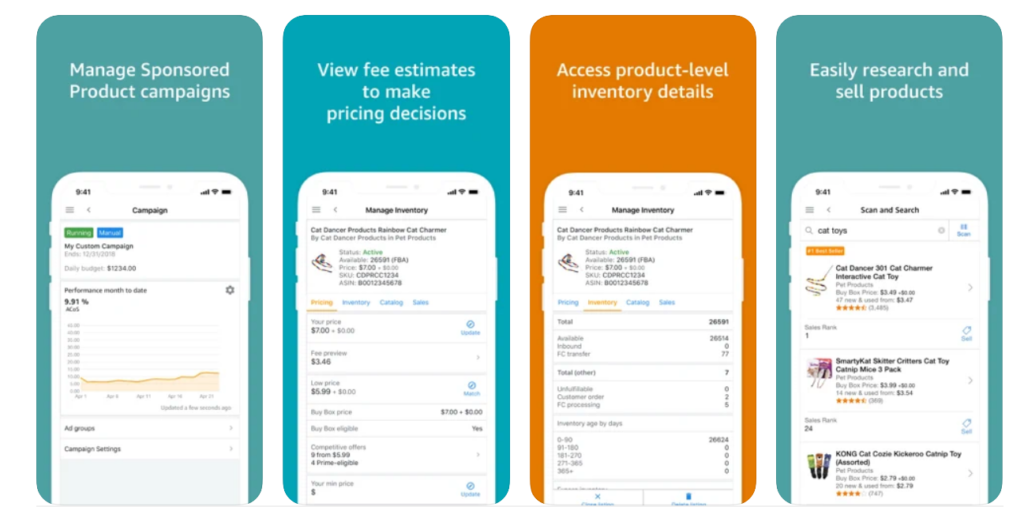
Amazon Seller App is recommended for newbie resellers and if your main selling platform is Amazon. The app helps you scan the potentially profitable titles as well as manage your entire reselling business. It is very handy, as it keeps everything in one place and is packed with data. It allows you to source products, keep track of your inventory and returns, analyze your sales, fulfill orders, and provide customer support. If you are using FBA, it handles packing, storing, shipping, and customer support for you.
Apart from the Amazon Seller App, there are other tools that you may benefit from both if you sell on Amazon and other platforms. We’ll focus on the tools that help in book reselling:
BookScouter
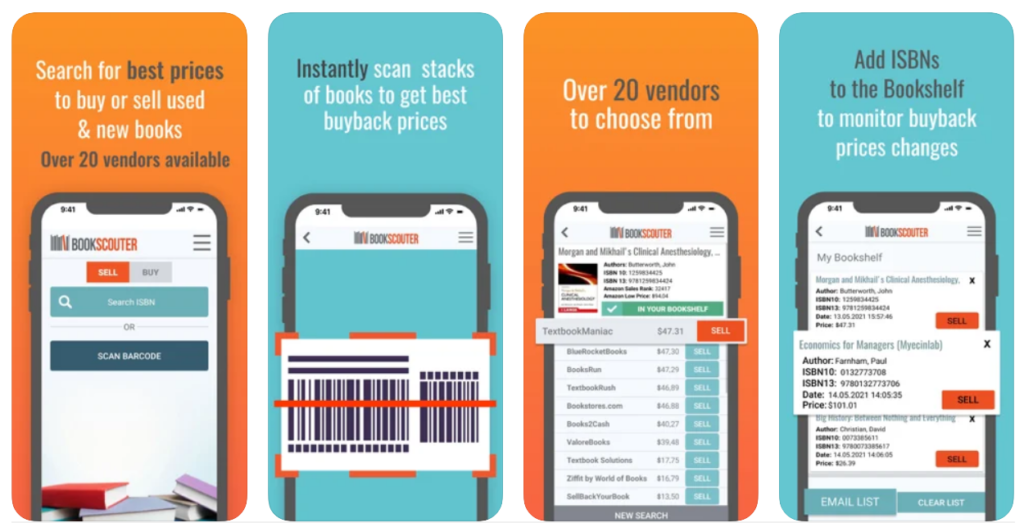
BookScouter is a tool you can use to compare prices on books from over 30 book buyback vendors. It is not a reselling platform like Amazon, but a price comparison platform and a mobile app (iOS, Android) that you can freely use to find the best price offers for your used books. You simply scan the book’s ISBN and place your order with the most suitable vendor. A mobile app allows scanning the books you find in local shops and on sales; you can also search the books by their IBSNs, titles, and authors on the website. It is convenient to have a tool that’ll show you the prices of the online booksellers other than Amazon, as the latter is not always the best offer on the market.
ScoutIQ
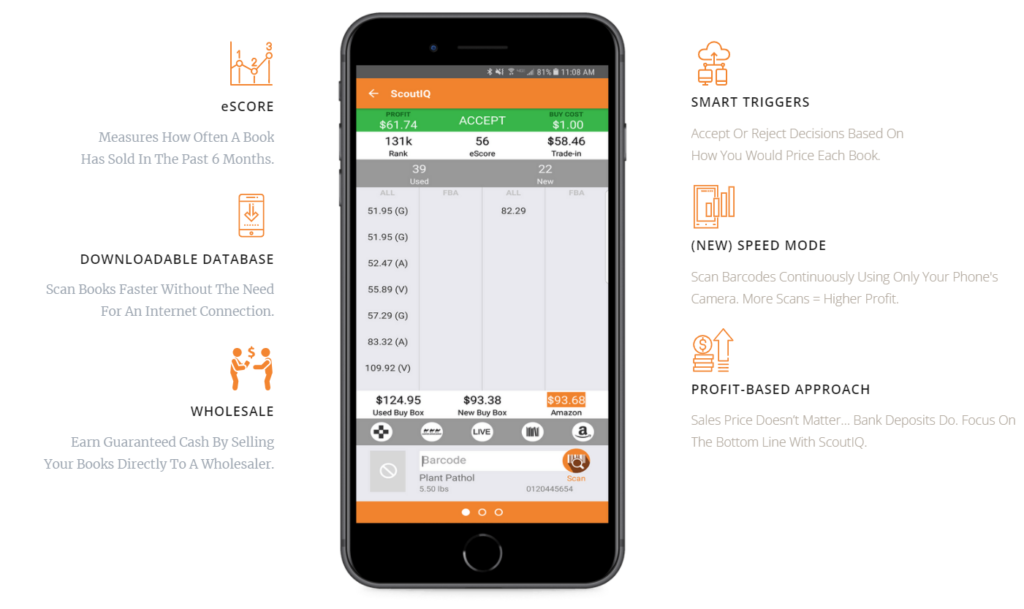
ScoutIQ can be used for retail arbitrage in general; however, it has proved to be quite useful among book scouts who resell books on Amazon. It offers analytical features and gives offline access to Amazon’s product database: you can download it and scan books anywhere. It is not entirely a budget app ($44 per month or $432 per year); however, it is well worth its money if you buy and sell in large bulks.
Keepa
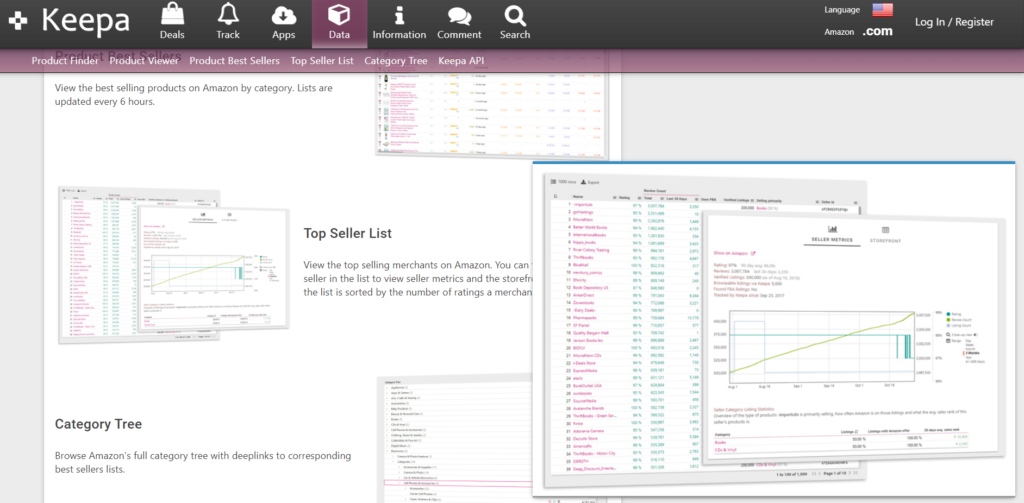
Keepa is another tool for Amazon resellers, highly praised for its price and sales data chart extension. If you are new at retail arbitrage, you probably don’t need it. However, you should keep this tool in mind if you are planning to scale your business. To be able to make predictions about the profitability of a product, you will need to look at its historical data. Here is where Keepa will help you out. It’s free, but if you need all the Data features, a monthly subscription of €19/month is required.
Scoutly
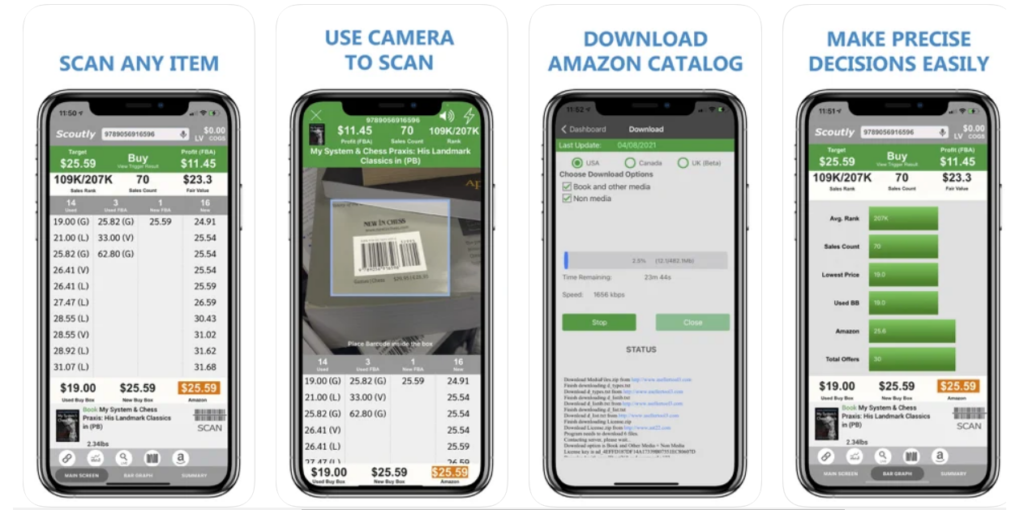
One more Amazon seller scanning tool recommended by seasoned Amazon resellers is Scoutly (FBAScan). The app also allows downloading the Amazon database and accessing it offline when you need to scan a product’s ISBN (Amazon U.S., Canada, and the UK). Live search is available for Amazon US, Canada, UK, France, Germany, Italy, and Spain. The pricing for this app is lower than for the tools with similar functionality:
Android
- Live Only + TurboLister (Amazon Listing Software): $9.95/mo
- Local Database + Live Search + TurboLister (Amazon Listing Software): $35/mo
iOS
- Lite plan: $9.99 a month.
- Professional plan: $34.99 a month.
Scoutify 2
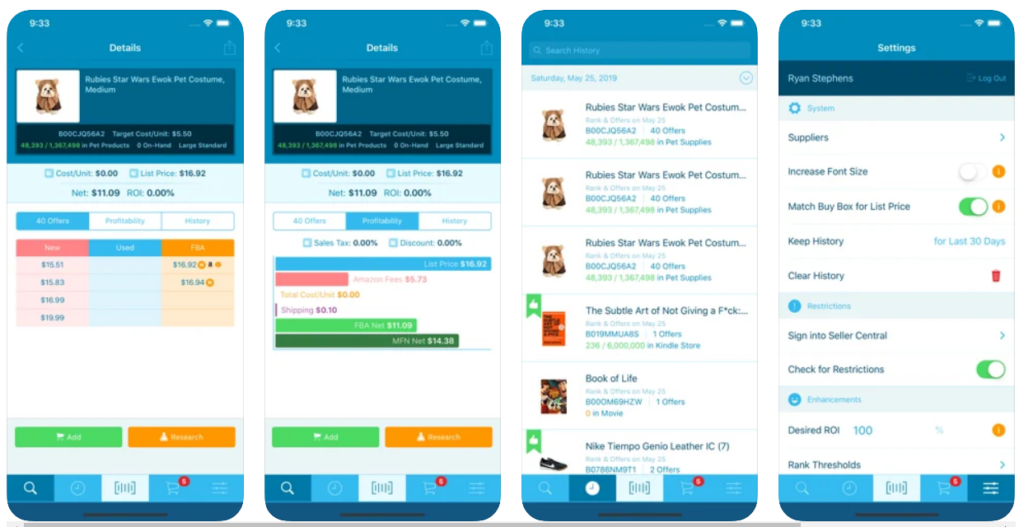
Scoutify 2 is a mobile app (iOS, Android) that can help you determine the potential profitability of a product and track your expenses. It requires an InventoryLab subscription, so you’ll have to get it first to be able to access FBA transactions and disposal fees, etc.
How Much Can You Make with Retail Arbitrage?
Pros and Cons of Retail Arbitrage
Entering the world of professional retail arbitrage may sound like a dream job. However, it may not be the one for you. Keep in mind that as any venture (be it a side hustle or a full-time job), retail reselling has its pros and cons. Here is what you’d want to consider before you decide to invest your time and money:
Pros
- You can earn some cash relatively quickly.
- Little investment is needed.
- You can work a few hours a day.
- You don’t need to be a specialist in any field to be a reseller.
Cons
- You can lose money.
- You’ll be facing a lot of competition.
- The products you bet on may not sell.
- You may have to work longer hours than you initially planned.
How Much Can You Make with Book Arbitrage?
While most people who are just starting on the path of retail arbitrage imagine how they easily find rare and valuable books for $0.99 and sell them on Amazon for $25-$70, getting huge profits, the reality rarely looks like this.
No profit is guaranteed when you sell via Amazon FBA or any other platform. There is no standard scheme that will lead to certain profit numbers if you follow the rules. It is possible that you can earn from $100 to $50,000 per month, but it is equally possible that you lose your money.
Here is a rough timeline for you to understand what to expect:
- First 3 months: $100–$500/mo
- 3–9 months: $500–$2000/mo
- After a year: $2000+/mo
While seasoned book scouts can achieve a considerable profit with time, you need to make a fair share of effort to reach a specific level. Regardless of everything, you will still have to invest, especially at the very beginning. Also, if you work a few hours a day, it is still working that needs to be done. Besides, you will have to learn a lot to be able to source books quickly, calculate fees and expenses on tools and platforms, and sell efficiently. Expect some time to pass before you come up with your own working scheme.
Initially, you are most likely to be buying cheap used books for $1-$4 and selling them with a minimal profit (sometimes even $0.5 for a book). With time, you’ll develop a strategy, select the best niche, and will be able to get feasible results.
Is Retail Arbitrage Legal?
The last question we’d like to answer in this article is whether retail arbitrage is legal. The short answer is yes, it is.
The act of reselling products is not illegal.
According to the First Sale Doctrine (17 U.S.C. § 109(a)), you can resell products you’ve bought: “…an individual who knowingly purchases a copy of a copyrighted work from the copyright holder receives the right to sell, display or otherwise dispose of that particular copy, notwithstanding the interests of the copyright owner.”
However, there were cases when retail product reselling was an issue on Amazon. If you do retail arbitrage, we strongly recommend that you avoid selling something that may cause controversy (e.g., a product of a well-known brand), and make sure you list it as New.
Always check whether the brand is adamant about allowing their products to be sold through authorized resellers only. The more you stick to the rules, the fewer problems you’ll have to face.
Another important recommendation is to keep the receipts of the things you’ve bought if possible and never sell any counterfeit products.
When it comes to books, the same First Sale Doctrine gives the owner of a book a right to sell, lend, or share their copies without acquiring any permissions and paying fees. What the owner cannot do is make copies and sell them. Reselling, however, is a totally different thing. So, you can freely sell used and second-hand books.
Conclusion
While retail arbitrage is a fascinating but quite competitive field, it can turn out to be quite profitable. If you decide to try your luck in product reselling, we hope you find our answers helpful.



